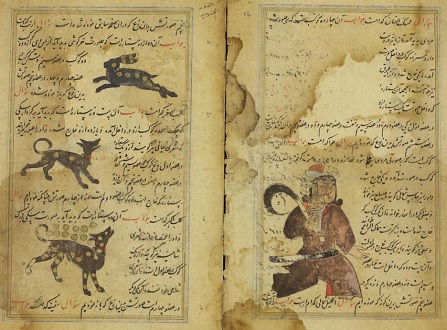מחוז החינוך של וילנה היה יחידה אדמיניסטרטיבית טריטוריאלית של משרד ההשכלה הרוסי אשר פיקחה על החינוך היסודי, התיכוני והגבוה באזורים של ליטא וצפון בלארוס. בהקשר הרב-אתני והרב-לאומי המורכב של האזור, הפכה יחידה זו למכשיר חשוב ליישום מדיניות אימפריאלית רוסית. מחוז החינוך של וילנה היה אחד מששת המחוזות הראשונים שהוקמו באימפריה הצארית בשנת 1803. האוסף הארכיוני של מטה מחוז החינוך מכיל עותקים של חומרים רבים הקשורים לחיי היהודים בשנים 1915-1804. האוסף כולל: מסמכים הנוגעים למדיניות שלטונות רוסיה בתחום החינוך היהודי; התכתבויות, בקשות ודוחות בדבר תוכניות להקמת בתי ספר יסודיים יהודיים; מסמכים אודות בית המדרש לרבנים בוילנה; נתונים על הצוות והתלמידים בבתי ספר שונים במחוז; חומרים על החינוך היהודי המסורתי (החדרים, המלמדים ושיבות כמו ישיבת וולוז'ין). האוסף מכיל גם חומרים על "חדרים מתוקנים", בתי ספר עבריים ביישובים שונים, מסמכים על הוצאת ספרים וצנזורה. אף מסמכים על ספריות יהודיות וחדרי קריאה נמצאים באוסף. כאן מצויים מעט חומרים הקשורים בהמרות הדת בידי היהודים ומסמכים אדמיניסטרטיביים שונים המתייחסים למבחני התלמידים, מינוי מורים, הנפקת אישורי הוראה, קיום בחינות הוראה ובחינות עבור חניכים רוקחים. חלק חשוב מהאוסף הם חומרים מסוף המאה ה-19 ותחילת המאה ה-20 המתייחסים לפעילות פוליטית וחברתית של סטודנטים יהודים במוסדות שונים --
Попечитель Виленского учебного округа
להגדלת הטקסט להקטנת הטקסט
| כותר |
Попечитель Виленского учебного округа. |
|---|---|
| יוצרים נוספים |
JudahOpatow Joseph Yozel,Günzburg baron, 1812-1878 F.Getts (Fayvl), 1853-1932 Solomon Salkind,Minor 1826-1900 The Rabbinical School and Teachers' Institute (Vilnius) ʻEts ḥayim (Yeshivah : Valozhyn, Belarus) |
| הערות |
The archive includes copies of selected materials from the collection of the Headquarters of the Educational District of Vilnius in the Lithuanian State Historical Archives (LVIA). |
| מתוך |
Lietuvos valstybės istorijos archyvas (LVIA), Vilnius - Copied Material |
| רמת התיאור |
Sub-Fonds Record |
| תקציר ביוגרפי |
In imperial Russia, educational districts were territorial administrative units of the Ministry of Popular Enlightenment, which supervised elementary, secondary and higher education in a given region. The educational district of Vilnius was one of the first six districts to be established in 1803. In the first decades of its existence, the district included the area between Lithuania and southern Ukraine (the governorates of Hrodna, Kaunas, Kiev, Minsk, Mogilev, Podolia, Vilnius, Vitebsk and Volhynia and the oblast of Bialystok). In 1818 the governorate of Kiev was transferred to the control of the educational district of Kharkov, and in 1826 the Governorates of Mogilev and Vitebsk were transferred to the jurisdiction of the educational district of St. Petersburg. In 1831 the governorates of Podolia and Volhynia were included in the educational district of Kharkov, and in 1832 the educational district of Vilnius was abolished and replaced by the educational district of Belorussia, established in Vitebsk in 1829. In 1836 the headquarters of the educational district of Belorussia were moved to Vilnius, and in 1850 this district was named again as the educational district of Vilnius. In 1850 it included the governorates of Hrodna, Kaunas, Minsk and Vilnius. In 1864 the governorates of Mogilev and Vitebsk were also included in the district's area of jurisdiction (in 1850-64 these governorates were under the authority of the educational district of St. Petersburg). |
| הערת שפה |
Russian and Polish |
| מספר מערכת |
990041729340205171 |
| קישורים |
Collection description in Yerusha Project פרטים על מיקום החומר/Location&access |
-
-
-
-
-
-
-
-
-
-
-
-
-
-
-
- הצג את 10 הפריטים הבאים מתוך 44
- הצג הכל
-
-
-
-
-
-
תנאי השימוש:
לכל תיק בארכיון נקבעו תנאי השימוש המתאימים
תנאי השימוש מופיעים בדף התיק הארכיוני באתר הספרייה הלאומית.
למידע נוסף על שירות בירור מצב זכויות היוצרים ותנאי השימוש בפריטים מאוספי הספרייה לחצו כאן.
תצוגת MARC
תגיות
- Jewish publishing -- Lithuania
- Censorship -- Lithuania
- Jewish libraries -- Lithuania -- History
- Jewish students -- Lithuania
- Jews -- Education -- Lithuania -- History -- 19th century
- Heder
- Yeshivot -- Lithuania -- History -- 19th century
- Yeshivot -- Belarus -- History -- 19th century
- Jews -- Education -- Belarus -- History -- 19th century
- Haskalah
- Vilnius (Lithuania)
- Minsk (Belarus)
- Vitsebsk (Belarus)
- Mahili︠o︡ŭ (Belarus)
- Hlusk (Belarus)
- Ni︠a︡sviz︠h︡ (Belarus)
- Valozhyn (Belarus)
- Kaunas (Lithuania)
- Ruzhany (Belarus)
- Telšiai (Lithuania)
- Hrodna (Belarus)
- Slutsk (Belarus)
- Vilijampolė (Kaunas, Lithuania)
יודעים עוד על הפריט? זיהיתם טעות?

 כניסה עם גוגל
כניסה עם גוגל
 כניסה עם פייסבוק
כניסה עם פייסבוק




